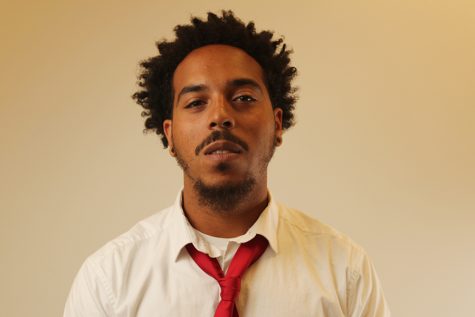Despite prejudice, transwoman shines pride, confidence
Nursing major Gianna Serrano, formerly known as Bryan Serrano, touches up her eye shadow on Friday. Serrano has been transitioning from a gay cis man to a transgender woman since 2016.
Feb 15, 2018
In a world where being different is often discouraged and mocked, people lose themselves trying to fit in with society’s perception of “normal” in fear of being scorned by family members and peers.
Some fight to ignore the mainstream’s daunting impression of what “normal” is to only find themselves bullied and shunned by society as weird or an outcast.
However, a few are born to boldly question and change society’s idea of “what is normal.”
Gianna Serrano unapologetically prides herself as one of those people.
Though given the name Bryan Serrano at birth, she feels that name never suited the person she was, or the gender with which she now identifies.
“When I hear that name I think, ‘that was me once before, but not anymore’,” Serrano said proudly with a gleeful smile, a smile brought forth from a confidence she only recently discovered since she began the transition two years ago from a gay cis (birth gender) man into a transgender woman.
“No one knows me as that anymore.”
Serrano grew an interest in drag shows and as a man would occasionally dress as a woman at shows. But she felt the dramatization of a man portraying a woman didn’t quite fit.
“I never felt like I was a drag queen,” Serrano said. “I felt the exaggeration of a man dressing like a woman was not me. For me, it felt more natural.”
During her time participating in drag shows she found and adopted her new name and fell in love with her new identity, Gianna Serrano. “Until I graduated high school I felt as if my body belonged to my parents,” Serrano said.
Now, at age 24, looking back in time, Serrano feels if her parents were more accepting of her situation earlier on, she would have started her transition sooner.
“I just got to a point where I felt like ‘this is my life, and this is how I want to live it. No one will stop me’,” she said.
She said her parents were never disappointed in her for her decision to transition, just worried about the dehumanizing attacks that often plague the LGBTQ community.
“I feel they believed in the misconception that if you’re gay, you’re weak. If you’re weak, you’re more prone to violence, which isn’t always the case,” Serrano said. “You hear stories about how people assault folks from the LGBTQ community and no doubt, that’s scary. But I think it’s also about the situations you put yourself in, you know?”
The medical regimen she utilizes to prepare her body for the transition consists of taking testosterone-blocking prescription pills daily and a bi-weekly estrogen shot to regulate and maintain the female hormones in her body and to keep her body’s production of testosterone at the lowest levels.
She plans on completing her transition by undergoing “sex reaffirming surgery” (SRS), the procedure to change the physical appearance and function of a person’s sexual organs. In her case Serrano will endure “male to female reassignment surgery” which includes the removing of the testicles and inversion of the penis to create a replica vagina. These types of surgeries can cost patients between $7,000 and $24,000. For that reason, Serrano has been saving money for the operation since she made the decision to have it done two years ago.
Serrano said it’s just another step into portraying the person she feels has been trapped inside her since as far back as she can remember.
Born in 1993 in Mexico City, Mexico, Serrano spent the earlier years of her life in Mexico under the care of her grandmother. At the age of 6 she accompanied her grandmother and brother on a trip to California to be reunited with her parents who journeyed there a few years prior.
Since she came to the U.S. at a young age, Serrano applied and was approved to receive DACA (Deferred Action for Childhood Arrivals) in 2012.
Once settled, Serrano began the third grade in Fairfield before moving with her parents to Albany.
With the insults gradually growing worse as she progressed through the grade levels, Serrano was a daily target of taunting and bullying.
Looked down upon and teased by other boys, Serrano preferred spending lunch with her girlfriends instead of trying to fit in with the guys.
Reminiscing on those days, she remembers being called words like gay, weird, soft and girly by boys who gained popularity for bullying her and others who they deemed eccentric.
“I didn’t know what any of those terms meant at the time. I was just being myself,” Serrano said.
And with English being her second language, the communication barrier prevented her from defending herself verbally in a language understood by her tormentors.
The mocking reached its peak in middle school as she experienced classmates and school yard bullies more heinous than in grades prior.
Before long she learned to ignore the hate of her bullies and focus on the reassuring love from friends.
Albany Middle school is also where Serrano met Brittany Curry. The two have been best friends since the eighth grade.
Curry has been present for all of Serrano’s journey; from a straight cis male to a gay cis male, now into a transgender woman.
Curry said she fully supports her friend’s decision to transition into a woman because she has noticed a sharp boost in Serrano’s self-esteem due to finally feeling free as the gender with which she always identified.
Serrano decided to come out to her parents in the seventh grade. Initially shocked, they demanded she attend weekly group sessions geared toward troubled teens to determine if the changes she was going through were just a phase in her young life.
“That made me feel like they were trying to change me,” Serrano said. “At the time they were saying they accepted me, but I didn’t feel as if they did.”
However, she didn’t let the lack of home support nor the bullying from peers impact her schooling. Serrano excelled in the classroom despite the mean-spirited taunting she received from judgmental classmates who considered her weird because of her feminine tendencies as a gay man.
As a Contra Costa College student since 2013, Serrano earned her associate degree in psychology in 2015 and began her transition while earning her certificate from CCC’s medical assisting program.
She’s currently taking nursing classes working toward her license to become a registered nurse.
Contrary to her dreadful experience throughout grade school, she’s now accepted for who she is by her peers in the nursing department.
Nursing professor Angela King-Jones said Serrano is a wonderfully knowledgeable student who’s always eager to learn and admired by her peers.
She said the students in the program are a close-knit group who all share an admiration for Serrano and her relentless strength to become the individual she longed to be, regardless of the disparaging criticism often slung her way from those who disfavor the LGBTQ lifestyle.
Dr. King-Jones said more importantly, her male peers address Serrano by the proper pronoun and the women accept her as one of their own.
“They do everything together like a family,” King-Jones said. “She’s just like any other female student I’ve had over the years. She shouldn’t be treated any differently.”
With her education she plans on becoming a nurse practitioner and opening her own clinic focusing on the mental health of children and teens.
“As a society we need to stop being so narrow-minded,” King-Jones said. “We’re all God’s children.”
“We all have one life to live and the right to get it right. We should all be able to feel free to live life the way we want.”



